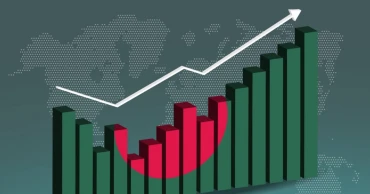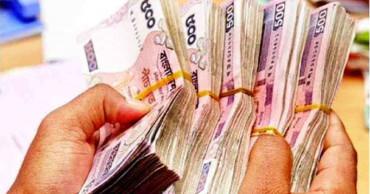Per capita income
Bangladesh’s GDP growth slows to 3.97% in FY2024–25
Bangladesh's economy has grown by 3.97 per cent in the current fiscal year 2024–25, down from 4.22 per cent in the previous fiscal year 2023–24, according to a provisional estimate released by the Bangladesh Bureau of Statistics (BBS) on Tuesday.
In 2022–23, the growth rate stood at 5.78 per cent.
Gross Domestic Product (GDP) refers to the final value of all goods and services produced within an economy over a specific period.
According to the BBS report, the per capita income of the people of Bangladesh has now reached USD 2,820 — the highest in the country’s history.
The provisional figures were published in the BBS’s preliminary national accounts for the 2024–25 fiscal year.
Dhaka eyes $500m budgetary support, $250m for railways from Tokyo: Shafiqul Alam
The per capita income has increased by 82 dollars compared to the previous fiscal year against 2,738 dollars in the past fiscal year.
The BBS also gave the provisional account of the per capita income, gross domestic product (GDP) for the 2024-25 fiscal year.
Earlier, the highest per capita income was 2,793 dollars in the 2021-22 fiscal year. After that, the per capita income did not increase in dollar terms due to the increase in the value of the dollar.
The per capita income is not a single income of an individual. The income received in addition to the country's domestic income, including income from abroad, is the total national income of a country. This calculation is made by dividing that national income by the total population.
According to the BBS's calculations, the per capita income in the 2021-22 fiscal year was 2,793 dollars. Then, the per capita income in the 2022-23 fiscal year decreased to $2,749. In the last fiscal year, it decreased further to $2,738.
Basically, the difference in per capita income in the BBS calculation is due to the increase in the dollar exchange rate. To calculate the BBS per capita income for the current fiscal year, the average exchange rate per dollar has been taken as Tk 120.29. Last time, this exchange rate was taken as Tk 111.06.
In the current fiscal year, the per capita income in Taka terms stood at Tk 3,39,221. In the last fiscal year, it was Tk 3,04,102.
7 months ago
Next stop, Smart Bangladesh: PM lays out renewed vision at BASA meet
Prime Minister Sheikh Hasina on Tuesday said her government wants to turn Bangladesh into a developed country with income per capita hitting at least $12,000 by 2041.
"We want to build Bangladesh as a developed country by 2041. We have been able to raise our per capita income $2824. But we don't want to remain stagnant at this stage, rather want to move forward in phases. Our goal is to attain at least $12,000 per capita income by 2041," she said.
The premier was addressing the annual conference of Bangladesh Administrative Service Association (BASA) at the Bangabandhu International Conference Centre (BICC) here.
Sheikh Hasina said now Bangladesh is the 35th largest economy in the world as the country has already jumped up five steps, which is not a small matter. “But keep it in mind that the faster you move forward, the more conspiracy and plots you will face,” she added.
Noting that many had not wanted Bangladesh to achieve independence, she said, “So, many don't like our progress. Those who had not supported us during our liberation war now can think that we (Bangladesh) are moving ahead defying them.”
She described herself as a dedicated person to serve the people. “I’ve come (in power) not to enjoy the power rather to give something to the people,” she added.
Mentioning that her government made the country as Digital Bangladesh, Sheikh Hasina said they have now announced that the country would be built as developed, prosperous and Smart Bangladesh by 2041.
In Smart Bangladesh, there would be a smart population equipped with IT knowledge, smart economy and smart government (means e-governance), she added.
Read more: AL never considers what it gets in return of working for the people: PM Hasina
The Prime Minister thanked the government officers and employees as the country is marching forward due to their sincere works.
“Today, Bangladesh has been able to move forward. The wheels of our economy remained moving even during the Covid-19 pandemic. So, I would like to thank you all. It has been possible because everyone worked with sincerity,” she said.
State Minister for the Public Administration Ministry Farhad Hossain, Cabinet Secretary Mahbub Hossain and PM's Principal Secretary M Tofazzel Hossain Miah also spoke at the event.
BASA President and also Shipping Secretary Md Mostafa Kamal delivered the welcome speech, while BASA secretary general and also additional secretary of Industries Ministry SM Alam gave the vote of thanks.
Read more: Far-right and far-left side with BNP to unseat govt: PM Hasina
2 years ago
Bangladesh's per capita income now $2,824
The per capita income in Bangladesh rose by 9 percent year-on-year to $2,824 in the fiscal year (FY) 2021-22, said the annual report of FY22 on ministries and divisions approved Monday.
The per capita income was $2,591 in FY21.
The performance-related annual report on ministries and divisions of FY22 was presented at the regular meeting of the cabinet. Prime Minister Sheikh Hasina presided over the meeting at her office.
Read: Growing per capita income contributed to reduce child marriage: Planning Minister
Later Cabinet Secretary Khandkar Anwarul Islam briefed the media at the secretariat in Dhaka.
The word per capita in Latin means by head. Per capita income is an indicator of how much money each person makes in a country or region.
This measurement assists in determining the average income per person, helping ascertain the quality of living for a population in a specific area.
Read: Govt giving false info about reserves, per capita income: BNP
Although per capita Income calculates gross domestic product and gross national income per capita, it cannot consider factors such as inflation, poverty, savings and economic welfare.
3 years ago
Bangladesh per capita income surges to US$ 2,824
The country’s per capita income increased by US$ 233 to US$ 2,824 during FY22, as per a provisional estimate of Bangladesh Bureau of Statistics (BBS).
Planning Minister MA Mannan disclosed this at a press briefing after the meeting of the Executive Committee of the National Economic Council (Ecnec) held at the NEC conference room here on Tuesday.
Also read: Growing per capita income contributed to reduce child marriage: Planning Minister
Prime Minister Sheikh Hasina chaired the meeting, joining it virtually from her official residence Ganobhaban.
“Our per capita income went up to US$ 2,824 or Tk 241,470 in the 2021-22 fiscal, which was US$ 2,591 in the last fiscal (2020-21),” said Mannan.
The GDP’s provisional estimate was done done based on the available data and statistics of 6-7 months of the current 2021-22.
As per the estimate, the GDP growth rate is 7.25 per cent in the FY22, which was 6.94 per cent in the last fiscal year, said the minister.
Also read: Don’t evaluate Bangladesh by Sri Lanka model: Mannan
The country’s GDP has increased to US$ 465 billion (Tk 39,76,500 crore) in the 2021-22 fiscal from US$ 416 billion (Tk 35,30,200 crore) in the 2020-21 fiscal.
Among the three major sectors, the growth rates are 2.20 per cent in the agriculture sector, 10.44 per cent in the industrial sector and 6.31 per cent in the service sector.
3 years ago
Per capita income to reach $3089 in next fiscal: Finance Minister
Finance Minister AHM Mustafa Kamal has expressed the hope that the country's per capita income will go up to $3,089 dollars in the next financial year.
He was briefing reporters after the virtually held two consecutive meetings of Cabinet Committee on Economic Affairs and Cabinet Committee on Public Purchase on Sunday.
Read: Per capita income to exceed $ 3,000 this year: LGRD minister
He also defended the government’s recent decision to allow some of the local enterprises to invest abroad and set up business ventures there.
“If we don’t allow investment abroad, money will go to different countries through hundi”, he said adding that some export-oriented firms were given permission to invest abroad under certain conditions and compliances.
He said those firms which have been exporting goods will get the opportunity to invest abroad by 20 per cent of their retention money or on the basis of their net assets.
Responding to a question on the projection of the International Monetary Fund (IMF) about slowing down the global economy, he said Bangladesh’s growth will continue.
"Last year, our GDP growth rate was 5.43 per cent and this year, our GDP growth will be 7.2,” he said defending his projection of $3,089 per capita income.
He said the size of the country's GDP will set a new milestone in the next fiscal year by touching the benchmark of half a trillion dollars. “Currently, our GDP is $455 billion and if it is divided into the total population, per capita income will stand at $2,785”.
Read: Rebased GDP increases per capita income by almost 16%
He noted that the government expects the GDP growth will be 7.2 per cent while the IMF has made a prediction to be 6.6 per cent.
Meanwhile, the Economic Affairs Committee approved three proposals while 18 proposals were approved by the Cabinet Committee on Public Purchase.
3 years ago
Per capita income to exceed $ 3,000 this year: LGRD minister
Local Government and Rural Development (LGRD) Minister Md Tajul Islam on Sunday expressed hope that the country’s average per capita income would exceed $ 3,000 by this year.
The minister said, “Our average income has increased like magic in the past decade due to the leadership of Bangabandhu's daughter Prime Minister Sheikh Hasina.”
He said this at the 'Bill Collection Award' giving ceremony organized by Dhaka WASA at Hotel Pan Pacific Sonargaon in the capital.
Read:Nationwide safe drinking water supply grid is under works: LGRD Minister
“When Sheikh Hasina came to power in 2009, our per capita income was below $700. In the last one decade, our per capita income has risen to $2,554,” he added.
He also said it may increase to three thousand dollars this year.
Tajul said Dhaka WASA has acquired the capacity to supply water to all city dwellers in the capital.
Besides, the government is working tirelessly to meet the water needs of people across the country, including setting up water treatment plants in Chattogram, Rajshahi and Khulna, he added.
The minister said that several initiatives have been taken and work is underway to provide quality water to Dhaka dwellers. Pipelines for water supply are very old and mostly unusable. Now they are being replaced with better quality pipes.
In this regard, he said that Dhaka WASA was able to supply 60 per cent water in the capital in 1996.
Prime Minister Sheikh Hasina has been working to improve water quality and increase supply. Of these, Sayedabad Water Treatment Plant Phase-1 and 2 have been completed, said the minister.
“Now the construction work of Sayedabad Phase-3 is going on. As a result of these development works, Dhaka WASA has already been able to supply water to cent per cent dwellers.”
However, there are many complaints received in WASA. The minister instructed the WASA authorities to be more responsible in resolving the allegations.
He said Sheikh Hasina's government is working for development in all sectors including power, education, health, communication, agriculture equally.
Read: Dengue cases likely to come down within a month: LGRD Minister
The PM has also set a target to graduate to a developed country by 2041. Already food shortages and 100% electrification as well as transformation into digital Bangladesh have been achieved.
Additional Secretary LGRD Department Muhammad Ibrahim, Bangladesh Securities and Exchange Commission (BSEC) Chairman Prof Shibli Rubayat-Ul-Islam and Dhaka WASA Managing Director Taqsem A Khan were also present at the event.
Thirty-four banks and three mobile banks were awarded crests and certificates for their special contribution to WASA bill collection.
4 years ago
Rebased GDP increases per capita income by almost 16%
Bangladesh's per capita income has increased to $2554 (USD) from $2227, a jump of nearly 16 percent, thanks to a new base year for calculating the country's gross domestic product (GDP).
The government recently finalized 2015-16 as the new base year to calculate (GDP). All national accounts will from now on be based on this new base year. Previously the government was using a base year of 2005-6.
Officials at the Bangladesh Bureau of Statistics (BBS) said the marked increase in the size of the GDP itself and attendant changes in per capita income will accrue mainly due to the inclusion of some new sectors in the calculation and price changes between the two periods.
Read:Per capita income in Bangladesh rises to US$ 2,227
Rebasing the GDP is the process of replacing an old base year with a more recent base year to keep up with the evolution in prices. In Bangladesh, the usual practice was to revise GDP base year every 10 years. The last time it was done was in 2013, when the base year was changed from 1995-96 to 2005-06.
However economists contend that increased economic growth and per capita income are not translating to a balanced distribution of national income among the people, leading to increased inequality where the benefits of growth are reaped by the few, not the many. Inequality has been further exacerbated during and by the Covid-19 pandemic, they said.
Selim Raihan, executive director of the South Asian Network on Economic Modeling (SANEM), was one of the economists who raised that point to UNB, even as he conceded there was some benefit from the relatively high economic growth, i.e . GDP growth, and its attendant per capita income growth.
“The ordinary people are benefiting from something. But it remains to be seen whether those gains will contribute to a transformation in the livelihoods of poor people,” he added.
The new base year means GDP figures for every year since will also change. As such, the per capita income for the 2015-16 fiscal year has now gone up to $1737 from $1465 in the old calculation
For the 2019-2020 fiscal, the per capita income has gone up to $2335 from $2024.
The news that Bangladesh had surpassed big neighbour India on the per capita income score, a measure of prosperity, caused a big ripple in 2020. According to the International Monetary Fund's (IMF) latest forecast released last month (October), Bangladesh is likely to maintain that lead through to the next fiscal - a shift from its earlier position that India was likely to quickly regain the lead.
Read: Bangladesh aims to attain 8 per cent GDP growth in 3 years: official document
But now it estimates Bangladesh's per capita GDP at current prices will be $2,138 in 2021, while India's will be $2,116. The rebasing is likely to bump the lead even higher.
India last rebased its GDP in 2015, a change that had bumped up the figure substantially. Nigeria's last rebasing in 2012 increased the size of its economy (GDP) by nearly 90 percent.
Rebasing is important in emerging economies with large informal sectors such as Bangladesh to capture more and more sections of the informal economy under formal reporting of national income, besides new or budding sectors that are growing fast. The new estimate of GDP comprises 21 broad sectors instead of the previous 15.
Talking to the news agency, a BBS official said the main objective of the project was to sensor modernisation of national accounts and related statistics in line with international guidelines and recommendations.
The other specific objective of the project is to improve different methods of GDP compilation. Updating GDP data series (base 2005-06) from 1972-73 to date, and developing a database on GDP (base 2015-16) from 1972-73 to date using software, will also fall under the project.
4 years ago
Bangladesh made spectacular economic progress despite limited resources: ICCB
Bangladesh has made spectacular economic progress over the last five decades despite limited resources, International Chamber of Commerce, Bangladesh (ICCB) President Mahbubur Rahman said Sunday.
"The GDP growth rate has reached a record high. Per capita income has also risen steadily," he said.
Read:Dhaka conveys protests to UK over human rights report
Rahman made the remarks while presenting the Executive Board Report of ICC Bangladesh for 2020 in its annual council held virtually in the city.
He said the country has achieved near self-sufficiency in food production for its population of 170 million.
"The country now even shoulders the burden of the world's largest refugee population of over 1 million Rohingyas who have fled persecution in neighbouring Myanmar," Rahman said.
ICCB President noted that Covid-19 has created not only a global economic crisis but the loss of millions of lives globally. "This has led to steep recessions in many countries. It has also had devastating effects on women, the young, the poor, people employed informally, and those working in contact-intensive sectors."
However, Bangladesh, which weathered the pandemic better than most economies in the sub-region, will continue to grow strongly as exports pick up.
Also read: Bangladesh urges IORA member states enhance economic cooperation
In Bangladesh, according to experts, not everyone has benefited equally from the nation's impressive growth and development because of rising income and wealth inequality, said the ICCB.
Another challenge is the heavy concentration of economic activity in big cities like Dhaka and Chattogram, resulting in a huge rural-urban divide and increased urban poverty, it said.
Referring to a recent study, the Executive Board Report mentioned that a staggering 96% of micro, small and medium enterprises (MSMEs) in Bangladesh lost income during the Covid-19 pandemic.
MSMEs in the country reported a median loss in business of 82% during the "national holidays" and customer footfall reduced by an average of 67%.
The recent upsurge of pandemic waves in India, which started in March 2021, has caused unprecedented and alarming infection and death.
The Indian virus has also spread in neighbouring countries including Bangladesh as well as the UK. Unfortunately, vaccine producing countries are reluctant to allow the production of vaccines in other countries, said ICCB.
Also read: Working to ensure economic solvency of people at grassroots: PM
Among others, ICC Bangladesh vice-presidents Rokia A Rahman and AK Azad; Syed Manzur Elahi, chairman, of Apex Footwear Ltd; Md Jashim Uddin, president, Federation of Bangladesh Chambers of Commerce & Industry (FBCCI); Rizwan Rahman, president, Dhaka Chamber of Commerce & Industry (DCCI), Mahbubul Alam, president, Chittagong Chamber of Commerce & Industry (CCCI); Rupali Chowdhury, president, Foreign Investors’ Chamber of Commerce & Industry (FICCI); Sheikh Kabir Hossain, president, Bangladesh Insurance Association (BIA); Faruque Hassan, president, Bangladesh Garment Manufacturers & Exporters Association (BGMEA); Mohammad Ali Khokon, president, Bangladesh Textile Mills Association (BTMA); Mohammad Hatem, first vice-president, Bangladesh Knitwear Manufacturers & Exporters Association (BKMEA), ICCB executive board members Abdul Hai Sarker, Aftab ul Islam, Kutubuddin Ahmed; Md Fazlul Hoque, Mir Nasir Hossain and Simeen Rahman; Muhammad A (Rumee) Ali, chairman, ICC Banking Commission and CEO, Bangladesh International Arbitration Centre (BIAC); ICCB members Mohammad Fazlul Azim, managing director, Azim Group; Md Mahbub Ur Rahman, CEO, The Hongkong and Shanghai Banking Corporation (HSBC) Ltd; Syed Waseque Md Ali, managing director, First Security Islami Bank Ltd; Syed Mahbubur Rahman, managing director & CEO; Mutual Trust Bank Ltd; Mohammad Shamsul Islam, managing director, National Housing Finance and Investments Limited; Tanvir Ahmed, managing director & CEO, Sheltech Ceramics Ltd.; Rubaiyat Jamil, managing director, ICE Technology; Md Abdul Jabbar, managing director, DBL Group; Dr Rubana Huq, managing director, The Mohammadi Limited; Tahrin Aman, president, Nordic Chamber of Commerce and Industry (NCCI); Anis A Khan, advisor to the board, Tyser Risk Management Bangladesh Limited (TRMBL); Mohd Arshad Ali, managing director, The Merchants Limited; Asif Ibrahim, vice-chairman, Newage Textiles Ltd; R Maksud Khan, chairman, Bengal Fine Ceramics Limited; Syed Ali Jowher Rizvi, managing director, Summit Alliance Port Limited; Md Abdul Jabbar, managing director, DBL Group; K A M Majedur Rahman, CEO, AK Khan & Company Ltd, Ataur Rahman, secretary general, ICC Bangladesh & Shamim Ahmed, deputy managing director, Mercantile Bank Ltd attended the meeting.
4 years ago
Per capita income in Bangladesh rises to US$ 2,227
The country’s per capita income has increased to US$ 2,227 (Tk 188,873) from US$ 2,064.
Planning Minister MA Mannan placed the statistics in the virtual Cabinet meeting held with Prime Minister Sheikh Hasina in the chair on Tuesday, said Cabinet Secretary Khandker Anwarul Islam while briefing reporters.
The Prime Minister virtually joined the meeting from her official residence Ganobhaban, while other Cabinet members from the Bangladesh Secretariat.
Read: Extension of lockdown causing anxiety among low-income earners
“Our per capita income has stood at US$ 2,227 in 2020-21 fiscal year. But the previous per capita income was US$ 2064. So, the growth is 9 percent,” said the Cabinet Secretary.
He said the country’s GDP has also increased to Tk 30,87,300 crore from Tk 27,96,358 crore, according to the primary data. “It’s a good achievement,” said the top bureaucrat.
In the meeting, the Prime Minister was greeted on her homecoming day.
Read Covid fallout: ADB lowers Bangladesh's FY21 growth forecast
4 years ago




.jpg)
.jpg)








